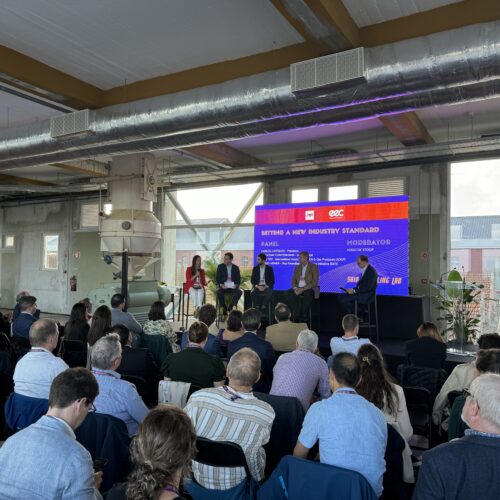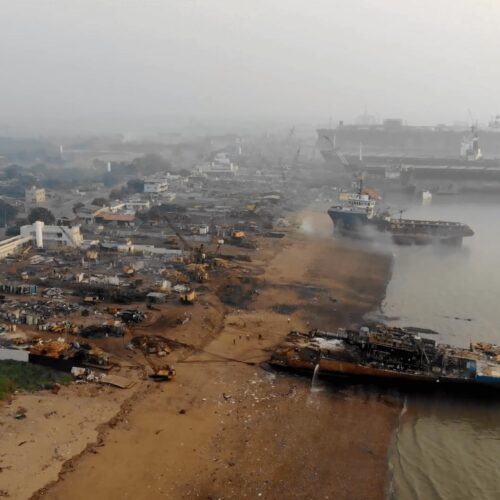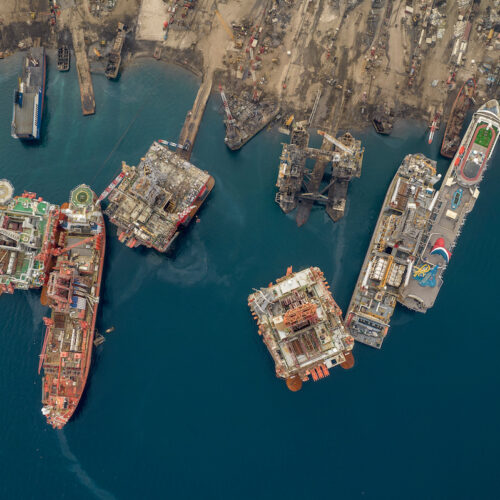Press Release – Brazil set to violate three international environmental treaties in sinking PCB-laden aircraft carrier in the Atlantic
Environmentalists denounce Brazilian Navy for 'criminal negligence'
As feared by the coalition of environmental and labour rights NGOs following the fate of the former aircraft carrier SÃO PAULO, the Brazilian Navy has seized the massive 265-meter-long ship and announced the intention to sink it in the Atlantic, instead of allowing it to be recycled as initially planned just a few months ago when it was sold to a Turkish breaking yard. The announcement that the vessel is to be sunk comes after the ship was sent back to Brazil in accordance with the terms of the Basel Convention on the Control of Transboundary Movements of Hazardous Wastes and their Disposal by the Turkish government, which in August 2022 withdrew its consent to import the vessel for recycling due to a series of illegalities. Once the ship returned to Brazil, the Brazilian Navy, however, inexplicably refused to allow it to dock safely in a Naval base. This refusal forced the owners of the vessel to tow it in circles off the coast of the Brazilian State of Pernambuco for three months seeking permission to berth it.
According to the NGOs, the Navy breached Basel rules by refusing to allow the vessel to safely dock in Brazil and now, with its move to sink the ship into the ocean, is likewise set to violate the Convention on the Prevention of Marine Pollution by Dumping of Wastes and Other Matter’s London Protocol 1996, as well as the Stockholm Convention on Persistent Organic Pollutants (POPs). The civil society coalition also expressed serious doubts that the ship is in danger of foundering and causing damage to the Brazilian coast, as claimed by the Navy. No evidence has been produced or published on government websites that there is any concern with respect to the hull except for the need for minor repairs.

While the environmental harm from dumping the many tons of asbestos on board the ship in the marine environment is unknown, based on the estimates of the sister ship of the SÃO PAULO -- the CLEMENCEAU, the ship is believed to contain more than 300 metric tonnes of PCB-laden materials in concentrations over 50ppm. PCBs are an extremely harmful contaminant of the marine environment due to their chronic toxicity and the capacity of the chemical to biomagnify its concentrations as it moves up the marine food chain.
Under the terms of the Stockholm Convention, POPs such as PCBs must be disposed of in such a way that the POP content is destroyed or irreversibly transformed, so they no longer exhibit the characteristics of POPs. Methods for the safe disposal of POPs have been developed and listed by the Stockholm and Basel Conventions, and ocean disposal is not an allowed method. Furthermore, the London Protocol prohibits the disposal of ships at sea without first thoroughly cleaning them of hazardous materials such as PCBs.
The early claim by Brazil and the ship owner that the SÃO PAULO did not contain PCBs, while the sister ship CLEMENCEAU clearly did, has never been substantiated in any way and was but one of the suspicious claims made in the Inventory of Hazardous Materials performed by surveyors working for the Turkish buyer of the ship. On the contrary, evidence exists to suggest otherwise. When the CLEMENCEAU was surveyed in 2006 by Bureau Veritas, PCBs were found in the wiring and gaskets in high concentrations. The surveyors were alarmed enough to surmise that all the cabling and wiring in the ship was likely contaminated. The Bureau Veritas’ report stated: “All cables (old or more recent, of any use) of the first type have a content greater than the regulation threshold, with some of them having very high content (for example, 23,350 mg/kg). 71% of the cable casings (old or more recent, of any use) of the second type have a content greater than the regulation threshold, with some having very high content (for example, 41,000 mg/kg). It is recommended that the electric cables be considered polluted by PCBs. Specific precautions are to be taken concerning cutting and handling.”
From a YouTube video of what appears to be the decommissioning ceremony on board the ship in 2018, one can see a freeze frame of a central corridor. Compare this to an archived photo of the CLEMENCEAU’s central corridor. It shows the same harnesses of cables in both ships. Further, the gaskets throughout the ship were also found to be contaminated with PCBs. There has been no record of removal of the wiring or gasketry on board the SÃO PAULO since decommissioning.

Related news

Press Release – Ship Recycling Lab’s 2nd Edition: when ethical leadership and cutting edge technology meet, sustainable ship recycling is on the horizon!
Over 100 participants met in Lisbon on 9-10 October.
... Read More
Press Release – Controversial Tide Carrier under arrest in Norway
After having been informed by the NGO Shipbreaking Platform and its member organisation Bellona that the TIDE CARRIER (now named HARRIER, aka EIDE CARRIER) had been… Read More

Press Release – Norwegian Altera Infrastructure fined for beaching two ships in India
Økokrim issued a fine of NOK 8 million on 10 June to shipping company Altera Infrastructure for having sold two vessels for scrapping India.
... Read More
Breaking Out News Series – Unlocking Brazil’s potential in ship recycling
We are excited to launch our Breaking Out News Series, in anticipation of the second edition of our Ship Recycling Lab in Lisbon this October. Highlighting innovators… Read More

Press Release – Fatal accident at Işıksan shipyard in İzmir
Four workers were directly affected by the gas exposure. Tragically, one of them lost his life.
... Read More
Press Release – Documentary reveals SBM’s toxic trade of ships in Alang
Dutch multinational SBM Offshore allowed a heavily polluted tanker to be demolished on the beach in 2018.
... Read More
Platform News – Maersk maintains beaching mantra and chooses to ignore facts revealed by Danwatch
After investigative journalists have revealed the severe short-comings of Maersk’s shipbreaking practices in Alang, India, the shipping giant blatantly disregards the findings. In an official statement, Maersk… Read More

